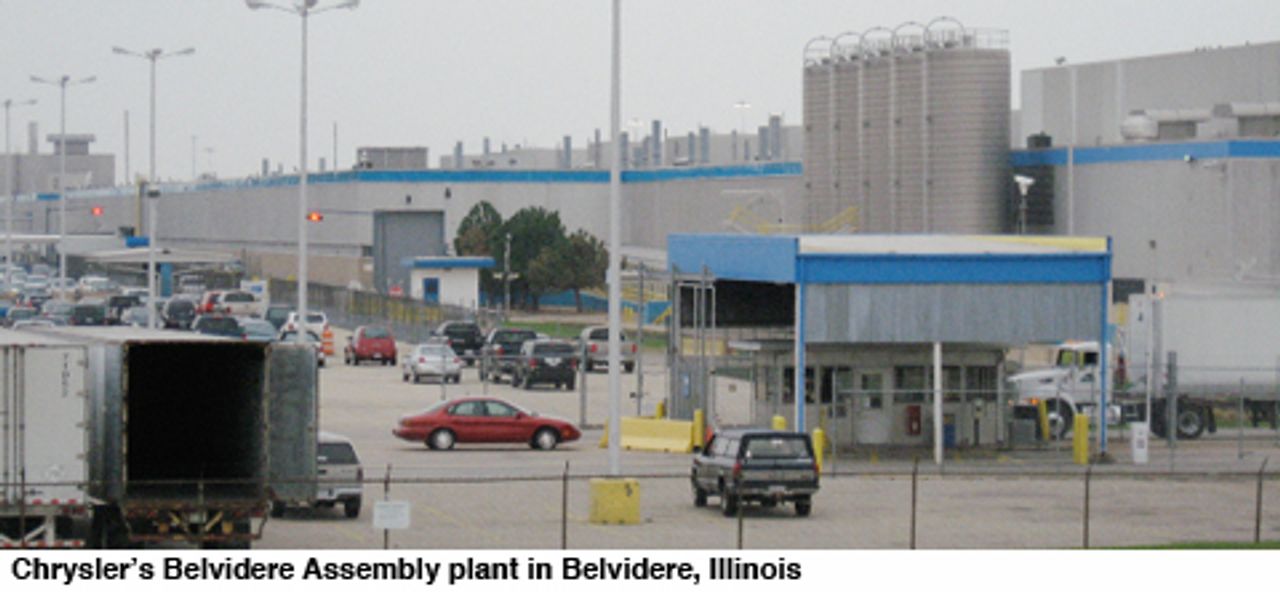Sales of new vehicles in the US plummeted in October as consumers—hit by growing unemployment, falling income and tighter credit—sharply reduced purchases of cars and trucks. Sales fell by a staggering 31.9 percent last month over the previous year in a further sign the US economy has entered a deep and protracted downturn, threatening the jobs of millions of working people.
Sales fell below a million for the second straight month to the lowest level since January 1991, according to Autodata Corp. At the current rate, automakers would only sell 10.56 million cars and trucks in 2008—down from 16 million in 2007—the lowest number since 1983, when the US economy struggled to emerge from the slump of the early 1980s.
Adjusted for increases in the US population, last month was the worst since World War II, GM sales analyst Michael DiGiovanni told reporters. “This is clearly a severe recession,” he said.
General Motors—which is seeking a government bailout to avert bankruptcy and expedite a merger with number-three US automaker Chrysler—suffered a 45 percent decline in sales. Chrysler sales fell by 35 percent and Ford’s fell by 30 percent. The sharp falloff also hit top-selling Japanese-based carmakers. Toyota saw a 23 percent decline despite offering zero percent financing; Honda’s sales dropped 28 percent.
 Further production cutbacks and the layoff of another 10,000 autoworkers over the last two weeks contributed to another drop in overall output at US factories. The Institute for Supply Management reported its manufacturing-activity index fell to a 26-year low in October. In addition, the Commerce Department reported that factory orders fell 2.5 percent in September from August levels, much worse than the 0.7 percent drop analysts had predicted.
Further production cutbacks and the layoff of another 10,000 autoworkers over the last two weeks contributed to another drop in overall output at US factories. The Institute for Supply Management reported its manufacturing-activity index fell to a 26-year low in October. In addition, the Commerce Department reported that factory orders fell 2.5 percent in September from August levels, much worse than the 0.7 percent drop analysts had predicted.
As a result of falling demand from steelmakers—a key supplier for all manufacturers—production at 17 of the nation’s 29 blast furnaces is being shut down. “We’re dealing with a situation that could develop into another Great Depression, if not handled properly,” Daniel DiMicco, chief executive of Charlotte, North Carolina-based steelmaker Nucor Corp., told the Wall Street Journal.
The Detroit News reported auto executives expect the market to get even weaker and are bracing for a protracted slowdown. Ford economist Emily Morris said, “If we believe that the third quarter was not the bottom for the economy, it’s likely that the third quarter will not have been the worst for industry sales either,” she said.
With workers facing increasing economic insecurity, consumer confidence fell in October to its lowest level since 1967, when the Conference Board, a New York research group, began keeping records. After years of accessible car loans, the drying up of credit has hit the automakers hard. GM’s financing arm, GMAC, is reportedly offering loans only to customers with top credit scores. In many areas of the US, only a third or so of all customers would qualify for loans, a GM spokesman said.
One or more of Detroit’s Big Three automakers are not expected to survive the crisis. Last week, rating agency Moody’s downgraded Chrysler and GM debt for the second time in three months, as well as the debt of Ford’s lending arm, citing “the pace and severity of erosion in the U.S. automotive sector” and suggesting the companies might have difficulty remaining solvent through 2009.
The decades-long collapse of the US auto industry is one of the sharpest examples of the decline of American capitalism. In the 1970s, US carmakers controlled more than 80 percent of the US market, with GM selling more than half the cars. By 2008, Asian- and European-based carmakers accounted for 51 percent of US sales.
Faced with falling market share and profits, the auto executives carried out an unrelenting attack on the jobs and living standards of workers, which continues to this day. GM, which employed 350,000 unionized workers in 1970, now has fewer than 70,000 blue-collar workers. Entire cities, such as Detroit, Flint and Dayton, Ohio, have been ravaged by plant closings and mass layoffs.
The anticipated merger between GM and Chrysler would result in the shutdown of dozens of factories and the elimination of 50,000 jobs at the two companies. Tens of thousands more would lose their jobs at auto parts suppliers and related companies. In the face of these attacks, the United Auto Workers union (UAW) has openly collaborated with the employers against its own members. (See “GM-Chrysler merger: United Auto Workers union prepares another betrayal.” )
The downturn has spread throughout the economy. On Tuesday, lumber and building material supplier Louisiana-Pacific reported wider third-quarter losses, as the slumping housing market has undercut revenue. The Nashville, Tennessee-based company has closed sawmills, reduced production at other facilities and slashed hundreds of jobs.
For the fourth quarter, the company anticipates that most of its mills will be down for more time than they will operate. Chief Executive Richard Frost said, “The declining activity in the housing market, in both new construction and repair and remodeling, caused lower demand for our products at very challenging price levels. Business fell off even harder in September and remains basically paralyzed as a result of the banking and financial market crisis.”
Computer maker Dell—which is now completing plans announced last year to cut 8,900 jobs or 10 percent of its workforce—announced Tuesday that it will outline a new series of cost-cutting measures. These will include a hiring freeze and offers of voluntary severance packages, as well as one to five days’ compulsory vacation without pay, according to a Wall Street Journal report.
